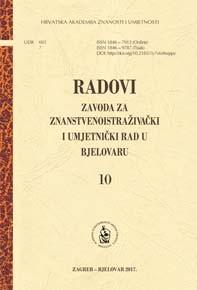Prijepori u pisanju Vojte Režnog o političkim prilikama u Kraljevini Srba, Hrvata i Slovenaca u razdoblju 1919. – 1921.
Matters of Dispute in the Writings by Vojta Režny on the Political situation in the Kindom of the Serbs, the Croats and the Slovenes in the Period 1919.‒1921.
Author(s): Vjenceslav HeroutSubject(s): History, Governance, Ethnohistory, Political history, Politics and society, Pre-WW I & WW I (1900 -1919), Interwar Period (1920 - 1939)
Published by: Hrvatska akademija znanosti i umjetnosti - Zavod za znanstvenoistraživački i umjetnički rad u Bjelovaru
Keywords: Vojta Režny; Stjepan Radić; Československe listy; Czechoslovakian Progressive Peasants’ Party; federalism; centralism; unitarism; separatism; demagogy; Czechoslovakian Union;
Summary/Abstract: The period between the proclamation of the Kingdom of the Serbs, the Croats and the Slovenes on 1st December 1918 and the passing of the Vidovdan Constitution in 1921 has been thoroughly treated in local historiography, yet in different ways. Not only historians from different parts of Yugoslavia, but also members of national minorities recorded this period. Vojta Režny stood by those politicians who were in favour of the monarchy, centralism and national unitarism. He believed that the Serbs, the Croats and the Slovenes were one single nation; his attitude was the same towards the Czechs and the Slovaks, whom he considered Czechoslovakians. In his opinion, those who did not share this policy were enemies of the state, separatists, and danger to the survival of the existing state. To him, Stjepan Radić represented the most serious adversary to the then state, though in that period, Radić spent more time in prison than outside. His attitude towards the situation in Czechoslovakia in the first after-war years was similar. Same as he considered Radić enemy of the state in Yugoslavia, Hlinka, who was also an advocate of federalism, represented for him enemy of the state in Czechoslovakia. Režny did not only engage in politics; he undoubtedly contributed much more in the field of culture – as animator of cultural life, in particular in the Bjelovar-Požega area, where the majority of members of Czech national minority lived. He further participated in establishing many cultural associations (beseda), and the parent organisation of the minority Czechoslovakian Union in 1921.
Journal: Radovi Zavoda za znanstvenoistraživački i umjetnički rad u Bjelovaru
- Issue Year: 2016
- Issue No: 10
- Page Range: 315-346
- Page Count: 32
- Language: Croatian

